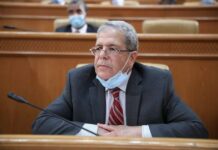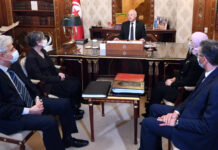The US House of Representatives session on “The Status of Democracy and American Next Steps” raised several questions regarding the American perception of what the relationship with Tunisia means, and to what extent the United States can go in an attempt to influence the political track in the countries from which the “Arab Spring” sparked about ten years ago.
The event drew the attention of the Tunisian authorities and public opinion. The hearing sparked controversy in Tunisia and was preceded by an official protest. Tunisian President Kais Saied called on the US ambassador to directly inform him of the “Tunisian state’s displeasure” with the Congress’ organization of this session, on October 14th.
On the same day, the Tunisian president spoke to the Council of Ministers, expressing his astonishment that the situation in Tunisia was included in foreign parliamentary agendas, and said that his country “does not have intercontinental missiles, but it does have intercontinental sovereignty.”
One of the explicit criticisms to President Kais Saied is what was stated by Republican member Greg Steube that “President Saied is not our friend. He has had positions against the United States and Israel since his election campaign and after his accession to the presidency, in addition to his socialist agendas.”
These sharp descriptions are not useful for Tunisia in relation to the United States, and if they remain without an appropriate response, they will greatly distort the image of the Tunisian authorities and threaten their interests in the American arena.
Undoubtedly, the upcoming visits of US officials to Tunisia will be an opportunity to calm the tension in the relationship with the decision-making circles in Washington, allowing the country to devote itself to addressing its crises, and not to engage in confrontations that some seek to impose regardless of their repercussions on the vital interests of Tunisia and its people.











